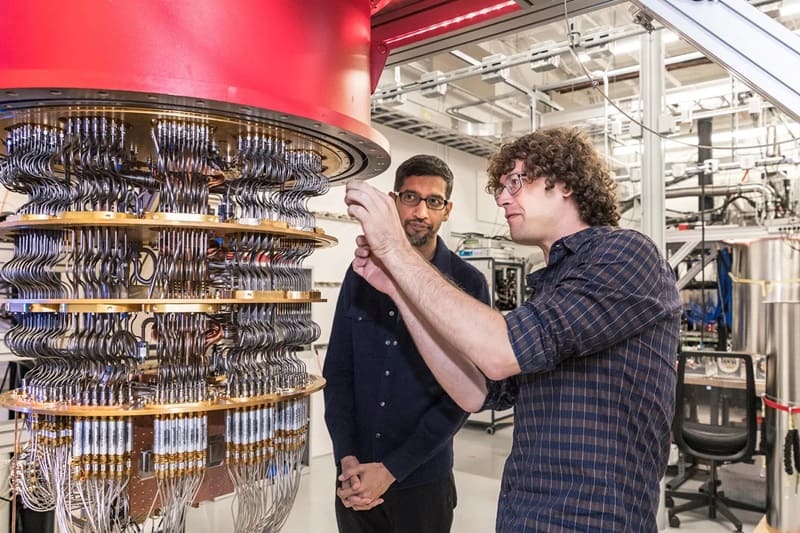
In recent years, the field of artificial intelligence (AI) has witnessed groundbreaking advancements. One of the most remarkable developments in this realm is the emergence of quantum AI, which combines the power of quantum computing with AI algorithms to solve complex problems more efficiently than ever before. This article delves into the transformative impact of quantum AI on language processing, shedding light on its underlying principles and exploring its potential future implications.
Understanding Quantum AI
Before delving into the intricacies of language processing, it is essential to grasp the basics of quantum AI. Quantum AI, also known as Quantum Artificial Intelligence, harnesses the principles of quantum computing to enhance the capabilities of AI systems. Unlike classical computing, which relies on bits to process information, quantum computing utilizes quantum bits, or qubits. Qubits can exist in multiple states simultaneously, known as superposition, allowing for parallel processing that vastly accelerates computations.
ADVERTISEMENT
Quantum computing is based on the principles of quantum mechanics, a branch of physics that explores the behavior of matter and energy at the smallest scales. In classical computing, bits are binary units of information that can represent either a 0 or a 1. In contrast, qubits can represent both 0 and 1 simultaneously, thanks to superposition. This unique property enables quantum computers to perform computations exponentially faster than classical computers for certain tasks.
Furthermore, quantum computing introduces another concept called entanglement. Entanglement occurs when two qubits are linked, so that the state of one qubit is dependent on the state of the other, even when separated by large distances. This characteristic allows for the creation of highly complex and interconnected systems, making quantum computing a promising area of research for various fields.
By combining the principles of quantum computing with AI algorithms, researchers have unlocked new possibilities for solving previously intractable problems. Quantum AI leverages the parallel processing capabilities of quantum computers to enhance the efficiency and effectiveness of AI algorithms. This powerful combination has opened up new frontiers in language processing—a field dedicated to enabling machines to understand and generate human language.
One fascinating application of quantum AI in language processing is the development of quantum natural language processing (QNLP) algorithms. QNLP algorithms leverage the unique properties of quantum computing, such as superposition and entanglement, to process and analyze human language data in ways that were previously unimaginable.
ADVERTISEMENT
For example, QNLP algorithms can simultaneously analyze multiple linguistic features of a text, such as syntax, semantics, and pragmatics, by representing them as quantum states. This allows for a more holistic understanding of language, enabling AI systems to generate more accurate and context-aware responses.
In addition, quantum AI has the potential to revolutionize machine translation. Traditional machine translation algorithms often struggle with capturing the nuances and idiomatic expressions of different languages. However, by leveraging the power of quantum computing, QNLP algorithms can process and analyze language data in a more nuanced and context-aware manner, leading to more accurate and natural-sounding translations.
Furthermore, quantum AI can also enhance sentiment analysis, a subfield of natural language processing that aims to determine the sentiment or emotional tone of a text. By utilizing the parallel processing capabilities of quantum computers, QNLP algorithms can analyze large volumes of text data and identify subtle emotional cues that may be missed by classical AI systems.
Overall, the intersection of AI and quantum computing holds tremendous potential for advancing the field of language processing. As researchers continue to explore and develop new quantum AI algorithms, we can expect to see significant advancements in areas such as machine translation, sentiment analysis, and natural language understanding. The future of language processing is undoubtedly quantum.

The Evolution of Language Processing
Language processing has come a long way since its inception. Initially, language processing techniques relied on traditional methods that heavily depended on rule-based algorithms. These algorithms would analyze linguistic patterns and syntax to understand and generate human language. However, these approaches often fell short when presented with complex sentences or ambiguous meanings.
Traditional Language Processing Techniques
In traditional language processing, algorithms would break down sentences into individual units, such as words or phrases, and analyze their relationships based on predefined rules. While this approach was effective for simpler sentences, it struggled with more complex linguistic structures. Additionally, traditional language processing techniques heavily relied on handcrafted rules, limiting their adaptability and scalability.
ADVERTISEMENT
The Limitations of Classical Language Processing
Classical language processing techniques faced several limitations. First and foremost, they lacked the ability to comprehend the nuances of human language. Ambiguities and context-dependent meanings often posed significant challenges for AI systems, as they struggled to accurately interpret and generate language in a human-like manner. Additionally, classical language processing techniques were computationally expensive, requiring substantial computational resources to handle the complexity of language.
With the advent of quantum AI, however, these limitations are being addressed with groundbreaking advancements in language processing.
Quantum AI in Language Processing
The integration of quantum computing into language processing, harnessing quantum AI’s edge, has the potential to revolutionize the field. By leveraging the parallel processing capabilities of quantum computers, Quantum AI offers a new paradigm for understanding and generating human language, thus greatly enhancing the sophistication and effectiveness of language processing technologies.
The Role of Quantum Computing in Language Processing
Quantum computing plays a crucial role in enhancing language processing algorithms. By harnessing quantum properties such as superposition and entanglement, quantum AI systems can process linguistic data at an unprecedented scale and speed. This enables the analysis of extensive language corpora and the extraction of valuable insights that were previously unattainable with classical approaches.
ADVERTISEMENT
Furthermore, quantum AI holds the potential to address the challenges posed by ambiguity and context. Quantum algorithms can effectively explore multiple linguistic interpretations simultaneously, allowing AI systems to generate more accurate and contextually aware responses.
Advancements and Innovations in Quantum AI for Language Processing
The advancements in quantum AI for language processing have already yielded promising results. Researchers have developed quantum algorithms capable of efficiently handling complex linguistic structures. These algorithms leverage the power of quantum computing to process and analyze vast amounts of language data in real-time, significantly enhancing the speed and efficiency of language processing tasks.
Furthermore, quantum AI enables deep learning models to be trained more effectively. Quantum neural networks, which leverage the principles of quantum computing, have shown promise in improving the accuracy and robustness of natural language understanding tasks. These advancements expand the capabilities of language processing systems, allowing for more sophisticated language-related applications.

The Impact of Quantum AI on Language Processing
The integration of quantum AI into language processing brings forth a multitude of benefits that have the potential to revolutionize numerous industries.
ADVERTISEMENT
Improvements in Speed and Efficiency
One of the primary advantages of quantum AI in language processing lies in its ability to process complex linguistic data at an accelerated pace. Quantum computers enable parallel processing and the simultaneous exploration of multiple linguistic interpretations, expediting language understanding and generation. This enhancement in speed and efficiency paves the way for advancements in real-time language translation, sentiment analysis, and other language-related applications.
Enhanced Accuracy in Language Understanding
Quantum AI facilitates the creation of more accurate language models. By leveraging quantum algorithms and neural networks, language processing systems can generate more contextually aware responses and better comprehend nuanced linguistic nuances. This improved accuracy in language understanding has far-reaching implications for virtual assistants, chatbots, and other AI-based language interfaces, enabling more natural and efficient interactions with users.
The Future of Language Processing with Quantum AI
The potential of quantum AI in language processing is vast, and the future holds exciting prospects for this dynamic field.
Predicted Developments in Quantum AI
Researchers are actively exploring various avenues to harness the full potential of quantum AI in language processing. Further advancements in quantum algorithms and quantum machine learning models are anticipated, enabling more sophisticated and comprehensive language understanding and generation. Additionally, the integration of quantum AI with other emerging technologies like natural language processing and computer vision will foster even more powerful and adaptable language processing systems.
ADVERTISEMENT
Potential Challenges and Solutions in Quantum AI Implementation
As with any cutting-edge technology, there are challenges on the horizon for quantum AI implementation in language processing. Developing and optimizing quantum algorithms specifically tailored to language processing tasks remains a critical area of research.
Additionally, the hardware requirements for quantum computing pose challenges in terms of scalability and accessibility. However, researchers and industry experts are making significant strides in addressing these challenges, paving the way for widespread adoption and advancement of quantum AI in language processing.
In conclusion, the integration of quantum AI into language processing represents a groundbreaking paradigm shift. By leveraging the parallel processing capabilities of quantum computing, researchers are enhancing the speed, accuracy, and flexibility of language processing systems. As advancements in quantum AI continue to unfold, the future of language processing looks increasingly promising, revolutionizing numerous industries and opening up new possibilities for human-machine interaction.

ADVERTISEMENT
ADVERTISEMENT











